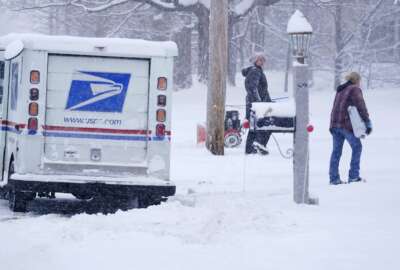Basic allowance for housing rates rising Jan. 1
In today's Federal Newscast: Service members will see basic allowance for housing rates increase by an average of 5.4% starting January 1. Senate Republicans say...
- The House passed the National Defense Authorization Act for 2024 and it now heads to the White House. The legislation would authorize the largest pay increase for service members and civilian employees in over two decades. It would also authorize $356 million over the Biden administration's budget request for building new barracks. As for modernization-related provisions, the bill would require the Defense Department to clearly establish roles and responsibilities needed to further develop the combined Joint All-Domain Command and Control (JADC2) architecture. It would also give the Office of Strategic Capital the ability to make investments in technologies that are not always supported through direct investments, such as supply-chain technologies. President Joe Biden is expected to sign the bill by the end of the year.(NDAA heads to Biden’s desk - DoD)
- A union of rural letter carriers is demanding the Postal Service do more to prevent payroll problems. The National Rural Letter Carriers Association has filed a national-level grievance over two cases where USPS did not get thousands of employees their paychecks on time. It proposes “harsh penalties” to compensate carriers if it happens again. Union President Don Maston said the penalties will incentivize USPS to modernize its legacy payroll system. "To continue to fail at this most basic of employer responsibilities — especially at this time of year, when so many carriers not only work long hours through the holidays, but also prepare for the holidays — is unacceptable,” Maston said.(Rural carrier union demands USPS pay ‘harsh penalties’ if payroll problems persist - Federal News Network)
- Participants should be on the lookout for upcoming changes affecting the Thrift Savings Plan. Starting in January, only traditional contributions in the TSP will count toward satisfying required minimum distributions (RMDs). That is just one of many changes from the SECURE 2.0 Act, a law passed in 2022 that aims to make it easier to save for retirement. Another change from the new law is already in place. It increased the age that TSP participants have to start taking RMDs to 73. Higher-earning TSP participants will also see a few changes coming, but not until 2026.(For TSP participants, more changes from SECURE 2.0 are coming soon - Federal News Network)
- Senate Republicans are pushing for answers on what they said is missing information on feds' use of official time. That is on-the-clock time that feds can spend working on union-related activities. The senators question why an Office of Personnel Management webpage documenting the use of official time appears to have been taken down. The senators said the information is critical for congressional oversight and they want OPM to explain why it was removed.(Letter to OPM on official time - Senate Republican)
- Service members will see basic allowance for housing rates increase by an average of 5.4% starting January 1. The amount will range from $85 to $194, depending on an individual's location, pay grade and dependency status. As long as service members maintain their eligibility, individual rate protection will prevent basic allowance for housing from going down in the event of housing costs dropping. Every year, the Defense Department allocates around $27.9 billion in basic allowance for housing disbursements to over one million service members.
- The Department of Veterans Affairs will be able to offer higher salaries to radiation specialists who treat veterans with cancer, if a bipartisan bill makes it through Congress. Two top lawmakers on the House VA Committee are reintroducing a bill that would set a higher pay cap for therapeutic medical physicists working at the VA. Their annual pay is currently capped at $195,000, but the bill would raise that cap to over $280,000. Technology Modernization Subcommittee Ranking Member Sheila Cherfilus-McCormick (D-Fla.) and Oversight and Investigations Subcommittee Chairwoman Jen Kiggans (R-Va.) are introducing the bill.(House lawmakers seek higher pay for VA radiation specialists treating vets with cancer - Federal News Network)
- Are you a fed traveling for work anytime soon? Plan to up your sustainability game by taking public transportation instead of cars, by taking trains instead of planes, and by renting electric vehicles instead of gas-powered cars. A new Office of Management and Budget memo instructs federal employees to prioritize sustainable travel for official business. In 2022, the General Services Administration said federal employees took more than 2.8 million flights, rented more than 2.3 million vehicles and went on 33,000 rail trips. OMB said these operational changes will accelerate the clean transportation transformation, increase good-paying union jobs and create healthier communities. Agencies have 120 days to report to OMB and the White House Council on Environmental Quality on their plans to carry out the new travel policy. (OMB's new sustainable travel policy - White House (OMB))
Copyright © 2025 Federal News Network. All rights reserved. This website is not intended for users located within the European Economic Area.
Peter Musurlian
Peter Musurlian is a producer at Federal News Network.
Follow @PMusurlianWFED






